
– 04-02-2024 –
Fifth Sunday in Ordinary Time
Gospel reading: Mark 1:29-39
vs.29 On leaving the synagogue, Jesus went with James and John straight to the house of Si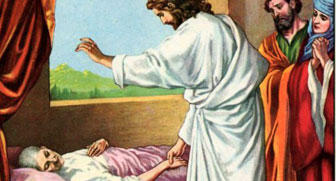 mon and Andrew.
mon and Andrew.
vs.30 Now Simon’s mother-in-law had gone to bed with fever,
and they told him about her straight-away.
vs.31 He went to her, took her by the hand and helped her up. And the fever left her and she began to wait on them.
vs.32 That evening, after sunset, they brought to him all who were sick and those who were possessed by devils.
vs.33 The whole town came crowding round the door,
vs.34 and he cured many who were suffering from diseases of one kind or another; he also cast out many devils, but he would not allow them to speak, because they knew who he was.
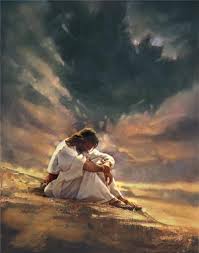 vs.35 In the morning, long before dawn, he got up and left the house, and went off to a lonely place and prayed there.
vs.35 In the morning, long before dawn, he got up and left the house, and went off to a lonely place and prayed there.
vs.36 Simon and his companions set out in search of him,
vs.37 and when they found him they said,
“Everybody is looking for you.”
vs.38 He answered,
“Let us go elsewhere, to the neighbouring towns,
so that I can preach there too, because that is why I came.”
vs.39 And he went all through Galilee, preaching in their synagogues and casting out devils.
*******************************************************************
We have three commentators available from whom you may wish to choose . Scroll down to the name of the commentator.
Michel DeVerteuil : A Holy Ghost Father, Specialist in Lectio Divina
Thomas O’Loughlin: Prof of Hist. Theol. Univ. of Nottingham NG7 2RD
Donal Neary SJ: Editor: Sacred Heart Messenger and National Director of The Apostleship of Prayer.
****************************************
Michel DeVerteuil
Lectio Divina with the Sunday Gospels
www.columba.ie
General Comments
Today’s gospel passage is in three sections:
– verses 29 – 31 : Jesus heals Peter’s mother-in-law;
– verses 32-34 : a general statement on Jesus’ ministry of healing;
– verses 35 – 39 : Jesus chooses to expand his ministry to neighbouring towns.
We can take one section at a time, on its own; or we can try to discern a movement flowing through the entire passage – this is the approach I propose. The passage then reveals a new dimension of Jesus’ ministry, the general outlines of which are drawn in these first Sundays of Ordinary time.
On the Third Sunday, Jesus announced the overall goal of his ministry – the Kingdom of God. The Fourth Sunday (Mark 1:21-28) showed that his ministry is a ministry of casting out unclean spirits with authority. On this Fifth Sunday, we get the further insight that Jesus will always be restless, he will never “have somewhere where he can lay his head.” He will always be on the lookout for new areas where his gospel needs to be preached.
T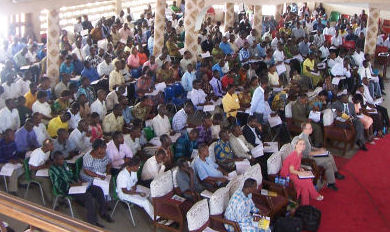 his has also been the mark of Jesus’ followers. In every age and culture, the Church has had its “missionaries“, men and women of generous spirit, happy and successful where they were, who realized that the gospel was not being preached among cultures, ethnic groups or social classes which were neglected by society and by the Church.
his has also been the mark of Jesus’ followers. In every age and culture, the Church has had its “missionaries“, men and women of generous spirit, happy and successful where they were, who realized that the gospel was not being preached among cultures, ethnic groups or social classes which were neglected by society and by the Church.
They stepped out courageously and moved into these “neighbouring country towns” so that the gospel of God’s love could be “preached there too.” Paul and Barnabas were the first. They left the prosperous community of Antioch to bring the good news to the Greek cities of Asia Minor. One thousand years later, St Francis of Assisi turned his back on his noble and wealthy family and lived as a brother among the poorest people of his area. In our time, Mother Teresa, comfortable and successful in a well established religious order, decided to move out and found a new community entirely dedicated to the dying on the streets of Calcutta.
In the secular world too, all great people come to the time when they must step out into an area their movement has neglected up to now. Nelson Mandela, for example, decided at some point in his life that he would work for reconciliation with his oppressors. People have given up successful careers in law, medicine, finance, education or management to work for the advancement of neglected communities.
It happens to all of us, at one time or another, that we find the courage to break new ground, to be reconciled with someone who had hurt our family, to move into some field where our services are needed. This passage celebrates such moments of grace – in the life of Jesus and in our lives.
In recent years, our Church has often made similar moves in many countries. It has given up its prestige and influence, risked loosing the patronage of the wealthy and the powerful, and stood at the side of the oppressed, “preaching there too.”
I t would be good to spend some time with the expression “because that is why I came.” Like so many phrases in the Bible, it is brief and seemingly simple, but it can transform our consciousness radically. When the Church neglects the marginalized it is always because it has forgotten the reason “why it came”.
t would be good to spend some time with the expression “because that is why I came.” Like so many phrases in the Bible, it is brief and seemingly simple, but it can transform our consciousness radically. When the Church neglects the marginalized it is always because it has forgotten the reason “why it came”.
This gospel passage reminds us that we will not take bold new decisions unless we are inwardly free, as Jesus was. It also teaches us the secret of his inner freedom – his regular, deep, personal prayer, the fact that he would “leave the house and go off to a lonely place to pray there” – another haunting little phrase.
Prayer Reflection
Lord, answering your call is often difficult.
Sometimes we are discouraged by our failures, but at other times it is success that prevents us.
Like Jesus, we must go against those who admire us and the work we are doing.
 They want us to continue where we are,
They want us to continue where we are,
they remind us of the good we do for people,
as friends, teachers, doctors, nurses or counsellors,
how we take them by the hand and help them,
so that the fever leaves them and they can wait on us.
They point out the people bringing to us all who are sick, and those who are possessed by devils,
so that it feels as if the whole town is there crowding round the door or our house.
We ourselves are pained to leave the many who are suffering from diseases
of one kind or another, or who need devils to be cast out.
Teach us to follow the example of Jesus; remind us that if we want to do your will
we must learn to get up in the morning, long before dawn,
and leave our house to go off to a lonely place and pray there,
so that when others come in search of us saying, “Everybody is looking for you,”
like Jesus, we will be free enough to choose what we know is right for us.
We will go to neighbouring regions where no one else has gone,
relate to those we have been keeping at arm’s length,
so that we can bring the good news of your love there too,
remembering that this is why we have come into the world.
Lord, forgive us, your church, that we have become complacent,
that we are content to congratulate ourselves
at whole towns crowding round our doors.
We pray that we will never lose the missionary spirit of Jesus,
so that, just as he went through all Galilee,
the church too will go through all areas of society and all cultures,
preaching your love wherever people are gathered, and casting out every kind of evil spirit.

********************************************************
Thomas O’Loughlin
Liturgical Resources for the Year of Matthew
www.columba.ie
Introduction to the Celebration
Today we recall that Jesus ‘went all through Galilee, preaching in the synagogues and casting out devils.‘ We gather at his table now because we acknowledge him to be the One who brings us healing, who has conquered evil, and who gives us life and hope.
Comments on Gospel: Mk 1:29-39
In this passage we see the beginnings of the public itinerant ministry in Galilee. However, there are one or two points of interest.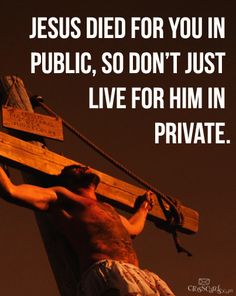
First, there is the combination of the public with the private. Jesus heals both in public, and in the private space of the house of Simon and Andrew. We hear of Jesus being in the public gaze of healing — ‘after sunset’ which we would express as ‘doing overtime’ — and then he is away in a private space in prayer and then back immediately to another public space to preach.
Second, it is interesting that the first private healing is of someone with fever — fever brought a dread to people in the ancient world that we cannot grasp (Luke in his version of this story links fever with demonic possession), and so being able to cure fever, and do it quickly, is a sign of heavenly power. The theme of the speed of the healing is expressed by the fact that Peter’s wife’s mother was ill with fever one moment, and the next was able to be up and about serving them.
At the outset of the ministry Mark wants to present Jesus as the one who brings healing and deliverance; now in this passage comes the additional task of preaching. But all the time, only the demons know his true identity, but he has such power over them that he can even keep them from speaking and spreading this news. Here we are getting our first glimpses of the Messianic Secret that is such a key theme in Mark’s theology.
Homily Notes
1. It is often the case that we perform actions in the liturgy while hardly ever thinking why we bother. Often when people are asked, for example, why we bring Communion to the sick, the only answer is that the priest wants it done, so because the minister likes to help out the priest, he or she does it.
Even worse occurs, however, when people think up their own rationale for actions without recourse to the fundamental rationale of Christian liturgy. That process was, and still is, the great factor leading to deformities in the liturgy over time, such as the enormous deformities in the liturgy of the Eucharist that were corrected after Vatican II.
People often wonder why there was need for such a radical break with the 1950s: the answer is that the extent of the surgery was adapted to the extent of the cancer! But such confusions do not just happen in the past, but all the time. Ask your Eucharistic Ministers why they bring Communion to the housebound, and you might get some theological surprises! I did so and got this morsel of confusion: if the sick can get Communion on the days they cannot get to Mass, but ideally should, they build up less ‘trouble‘ with God. Unpicking this, it was clear that this well-educated minister was not confusing’ not being able to get to Mass’ with sin (or what old textbooks called ‘material sin‘), but did think that God was running a merit /demerit system as a basis of salvation. Coupled with this was a notion that celebrations of the Eucharist were really there as a way of producing Holy Communion: so if the sick person could get the result without watching the preparation, then all was well! This is reminiscent of the eighteenth-century casuists’ question: why should bishops (presiding, not celebrating) be required by law to sit through long ceremonies when they had more important things to do, could they not just be given communion by their chaplains? Answer: Bishops and kings have to sit through the ceremonies on Sundays prior to receiving Communion as an act of penance! So the special minister I spoke to was the unwitting inheritor of a long tradition of teaching that we would all now rather forget.

2. Hence, it is a good idea to use the homily sometimes to reflect on just why we are doing what we are doing, and today’s gospel with its links to Jesus entering houses, healing, and eating makes this a good day to reflect on the links between the celebration of the Eucharist and care of the sick in the community.
3. A simple explanation would include these elements:
• We gather each week to become one people as brothers and sisters in Christ
• When we gather for the Eucharist we become the Body of Christ:
Jesus is the head of this body, we are the trunk and arms and legs.
• We show we are one body by having shares of one loaf and drinking from one cup.
• The cup of blessing which we bless, is a participation in the blood of Christ.
• The loaf which we break, is a participation in the body of Christ.
• Because there is one loaf, we who are many are one body, for we all partake of the one loaf.
• But we recall that there are sisters and brothers in this community who cannot gather with us because they are sick or housebound.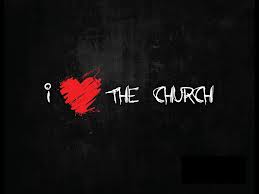 • So we bring them a share of our one loaf, the portion carried to them by the Minister of the Eucharist.
• So we bring them a share of our one loaf, the portion carried to them by the Minister of the Eucharist.
• Then through that sharing, they become one with the rest of us and with Christ.
• The Ministers carrying portions of our loaf to the sick and housebound of the community are forming the links and sinews of the Christ’s body
**********************************************
Donal Neary SJ
Gospel Reflections
www.messenger.ie/bookshop/
Darkness and Light
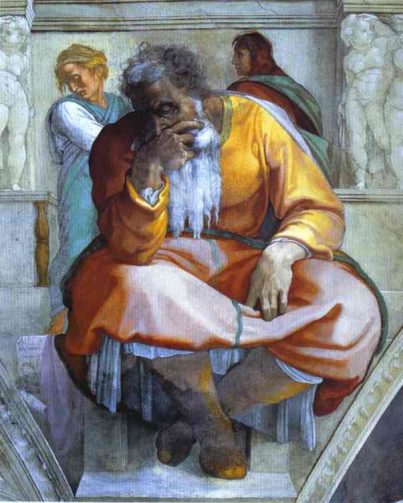 The first reading is tough to hear and we admire Job. We talk of ‘the patience of Job’. Job is the example and the hero of depression. He just had it bad. All had gone wrong and he felt no good, no hope, no meaning.
The first reading is tough to hear and we admire Job. We talk of ‘the patience of Job’. Job is the example and the hero of depression. He just had it bad. All had gone wrong and he felt no good, no hope, no meaning.
His family collapsed,
his wealth disappeared
and he cursed the day he was born.
He went through all of the depressions people have, but somehow kept that glimmer of light alive. He never totally lost God, and God never lost him.
Depression is a huge illness. Many suffer; many are affected. Treatment can be of help, and the listening times of friends as well as therapy is healing.
A great priest wrote
“…. At the worst of the burn out I couldn’t say mass, never mind preach. Dry, empty, without light or life. Thanks again for the card you sent. It means a lot to me now. Funny, in the worst of my anxiety, nothing, no compliment, and no reassurance… meant anything to me.”
There are many helps on the human level. There is the help also of faith and prayer at times. And the help of someone who, listens, sympathises, doesn’t judge nor give easy cures. Love from God never ends even though it may not appear near just now. This is the Jesus of the gospel – bringing the grace of healing, of freeing from any evil, of constant love.
Imagine a time of darkness in life; picture it in its colour,
and imagine the bright light of Jesus penetrate that darkness.
Ask for help and give thanks for help. Give light, Good Lord,
to all who live in the valley of darkness and the shadow of doubt.
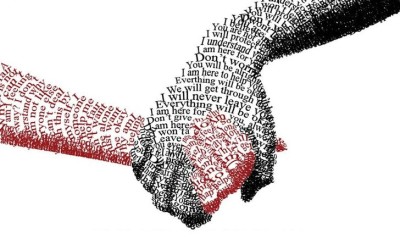
Words and deeds, together, always
*************************************************